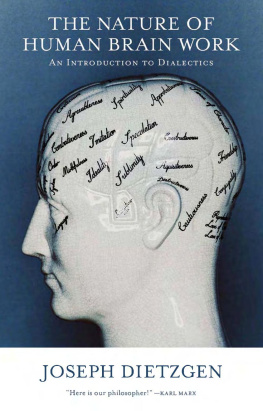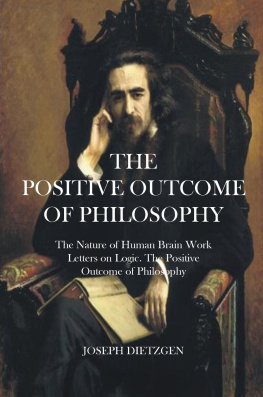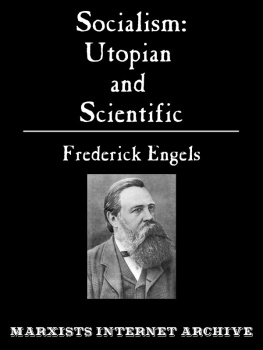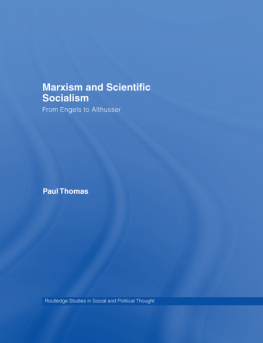Joseph Dietzgen - Scientific Socialism
Here you can read online Joseph Dietzgen - Scientific Socialism full text of the book (entire story) in english for free. Download pdf and epub, get meaning, cover and reviews about this ebook. year: 2016, genre: Religion. Description of the work, (preface) as well as reviews are available. Best literature library LitArk.com created for fans of good reading and offers a wide selection of genres:
Romance novel
Science fiction
Adventure
Detective
Science
History
Home and family
Prose
Art
Politics
Computer
Non-fiction
Religion
Business
Children
Humor
Choose a favorite category and find really read worthwhile books. Enjoy immersion in the world of imagination, feel the emotions of the characters or learn something new for yourself, make an fascinating discovery.

- Book:Scientific Socialism
- Author:
- Genre:
- Year:2016
- Rating:3 / 5
- Favourites:Add to favourites
- Your mark:
- 60
- 1
- 2
- 3
- 4
- 5
Scientific Socialism: summary, description and annotation
We offer to read an annotation, description, summary or preface (depends on what the author of the book "Scientific Socialism" wrote himself). If you haven't found the necessary information about the book — write in the comments, we will try to find it.
Scientific Socialism — read online for free the complete book (whole text) full work
Below is the text of the book, divided by pages. System saving the place of the last page read, allows you to conveniently read the book "Scientific Socialism" online for free, without having to search again every time where you left off. Put a bookmark, and you can go to the page where you finished reading at any time.
Font size:
Interval:
Bookmark:

First published: Volksataat, 1873;
Source: Philosophical Essays, 1917;
Scanned and marked up: Andy Blunden Proofread: Andy Carloff, 2010
A considerable number of readers of the Volksstaat are opposed to elaborate and searching essays in these columns. I doubted therefore whether the following would be suitable for publication. Let the editor decide. Yes I beg to consider whether it is not as valuable to engage the more advanced minds and to gain qualified thoroughgoing comrades as to strive for great numbers by publishing popular articles. Both these aims, I think, should be kept in view. If the party is really of opinion that the emancipation from misery cannot be accomplished by mending particular evils but by a fundamental revolution of society, it necessarily follows that an agitation on the surface is inadequate and that it is moreover our duty to undertake an enquiry into the very basis of social life. Let us now proceed:
Contemporary socialism is communistic. Socialism and communism are now so near each other that there is hardly any difference between them. In the past they differed from each other as does liberalism from democracy, the latter being in both cases the consistent and radical application of the former. From all other political theories communistic socialism is distinguished by its principle that the people can only be free when they free themselves from poverty, when their struggle for freedom is fought out on the social, i. e., on the economic, field. There is this difference between the modern and the older socialistic and communistic theories: in the past it was the feeling, the unconscious rebellion, against the unjust distribution of wealth, which constituted the basis of socialism; to-day it is based on knowledge, on the clear recognition of our historic development. In the past socialists and communists were able only to find out the deficiencies and evils of existing society. Their schemes for social reconstruction were fantastic. Their views were evolved not from the world of realities, not from the concrete conditions surrounding them, but from their mental speculations, and were therefore whimsical and sentimental. Modern socialism, on the other hand, is scientific, just as scientists arrive at their generalizations not by mere speculation, but by observing the phenomena of the material world, so are the socialistic and communistic theories not idle schemes, but generalizations drawn from economic facts. We see for instance that the communistic mode of work is being more and more organized by the bourgeoisie itself. Only the distribution still proceeds on the old lines and the product is withheld from the people. The small production is disappearing while production on a large scale takes its place.
Those are facts resulting from the economic development of history and not from any conspiracy of communistic socialists. If we define work as an industrial undertaking whose products the worker uses for his own consumption, and an industrial undertaking as the work, whose products go to the market, then it is not difficult to perceive how the development of industry must finally result in an organization of productive work. On the material organization of society scientific socialism is based.
Scientific socialists apply the inductive method. They stick to facts. They live in the real world and not in the spiritualist regions of scholasticism. The society we are striving for differs from the present but by formal modifications. Indeed, the society of the future is contained in the present society as the young bird is in the egg. Modern socialism is as yet more of a scientific doctrine than of a political party creed, though we are also rapidly approaching this stage. And strange to say, the international is of purely national descent: it proceeds from the German philosophy. If there be a grain of truth in the prating of German science, then the scientific German can only be found in his philosophic speculation. This speculation is on the whole an adventurous journey, yet at the same time a voyage of discovery. As the clumsy musket of our forefathers represents a necessary stage to the Prussian needle gun of the present time, so the metaphysical speculations of a Leibnitz, Kant, Fichte, Hegel are the. inevitable paths leading up to the scientific proposition, that the idea, the conception, the logic or the thinking are not the premise, but the result of material phenomena. The interminable discussions between idealism and materialism, between nominalists and spiritualists on the one hand, and the realists or sensualists on the other hand, as to whether the idea was produced by the world or the world by the idea, and which of the two was the cause or the effect this discussion, I say, forms the essence of philosophy. Its mission was to solve the antithesis between thought and being, between the ideal and the material. A proof of this view I find in the fortnightly review Unsere Zeit for the second half of January, 1873, in an essay on intoxicating articles of consumption, as wine, tobacco, coffee, brandy, opium, etc. The author, after having stated that the use of intoxicants was to be found among all nations at all times and under all conditions of human society, proceeds to declare that the cause of that fact must be looked for there, where the cause of all religion and philosophy lies, in the antithesis of our being, in the partly divine, partly animal nature of man. This antagonism between divinity and animality in human nature is in other words the antithesis between the ideal and the material. Religion and philosophy work towards a reconciliation of those conflicting principles. Philosophy proceeded from religion and began to rebel against its conception of life. In religion the idea is the primary element which creates and regulates matter. Philosophy, the daughter of religion, naturally inherited a good deal of her mothers blood. She needed ages of growth to generate the antireligious, scientific result, the apodictically safe proposition, that the world is not the attribute of spirit, but, on the contrary, that spirit, thought, idea is only one of the attributes of matter. Hegel, it is true, did, not carry science to that height, yet so near was he to it that two of his followers, Feuerbach and Marx, scaled the summit. The clearing up of speculation helped Feuerbach to give us his wonderful analysis of religion, and enabled Marx to penetrate the deepest recesses of law, politics and history. When, we see, however, Herbart, Schopenhauer, Hartman, etc., still going on speculating and philosophizing, we cannot regard them as more than stragglers, lost in the phantastic depth of their own thoughts, lagging behind in the back-woods and not knowing that the speculative fire has been overcome in the front. On the other hand, Marx, the leader of scientific socialism, is achieving splendid success by applying inductive logic to branches of knowledge which have hitherto been maltreated by speculation. As far back as the year, 1620 Francis Bacon declared in his Novum Organon the inductive method as the saviour from unfruitful scholasticism and as the rock on which modern science was to be built.
Indeed, where we have to deal with concrete phenomena, or, as it were, with palpable things, the method of materialism has long since reigned supremely. Yet, it needed more than practical success: it needed the theoretical working-out in all its details in order to completely rout its enemy, the scholastic speculation or deduction. In his famous History of Civilization in England Thomas Buckle speaks at great length of the difference between the deductive and inductive mind, without, as it seems, having grasped the essence of the matter; he but proves what he admits himself in the introduction to his work that, though having made German philosophy a serious study, he did not fully penetrate it. If this happens to ripe and ingenious scholarship, what shall become of immature and superficial general knowledge which deals not with specialties but with the general results of science? In order to indicate clearly the scientific basis of socialism, I venture to enter more fully into the general result of philosophy, into the solution of the antithesis between the deductive and inductive method. But I fear lest the result of metaphysics, so ostentatiously announced, may appear to the reader as somewhat insignificant and commonplace. I beg, therefore, to remind you of Columbus who by means of an egg once for all furnished the proof that great discoveries resolve themselves into an ingenious, yet simple, idea.
Next pageFont size:
Interval:
Bookmark:
Similar books «Scientific Socialism»
Look at similar books to Scientific Socialism. We have selected literature similar in name and meaning in the hope of providing readers with more options to find new, interesting, not yet read works.
Discussion, reviews of the book Scientific Socialism and just readers' own opinions. Leave your comments, write what you think about the work, its meaning or the main characters. Specify what exactly you liked and what you didn't like, and why you think so.




